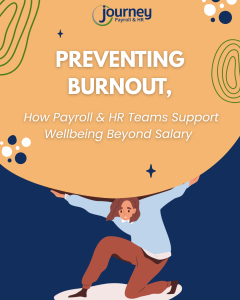Burnout isn’t just an individual problem; it’s a systems problem. Pay accuracy, schedules, workload, and access to time off all drive (or reduce) stress. Payroll and HR teams are uniquely positioned to spot early warning signs and build a healthier rhythm of work.
 Use payroll data as an early warning system
Use payroll data as an early warning system
Look for patterns that predict burnout: rising overtime, frequent weekend work, compressed pay cycles, or employees deferring PTO. Share monthly dashboards with leaders so they can rebalance workloads before people hit a wall.
Make pay feel reliable, simple, and fair
On‑time, accurate payroll is foundational to psychological safety. Eliminate manual handoffs, reconcile deductions proactively, and fix errors fast. Consider earned wage access or more frequent pay cycles where appropriate, clarity and predictability reduce financial stress.
Turn PTO from a policy into a practice
Managers should model time off and approve requests promptly. Nudge employees with high balances to plan breaks, and coordinate with staffing so coverage is seamless. Tie PTO planning to peak workload calendars to avoid crunch periods.
Design work, not just perks
Wellbeing isn’t solved with snacks. Reduce meeting overload, protect focus time, and set norms for after‑hours messaging. Use flexible schedules, compressed weeks, or job‑sharing where roles allow. Define what “urgent” actually means.
Support the whole person
Offer mental‑health benefits (EAP, therapy coverage), caregiving resources, and financial‑wellness tools. Train managers to spot signs of strain and route employees to support early before issues escalate.
Measure, learn, adjust
Pair pulse surveys with hard data (turnover, absenteeism, overtime). Share the results, commit to two or three fixes per quarter, and close the loop with employees on what changed.
Next Steps: Ready to turn burnout risk into a resilience plan? Journey Payroll & HR can align payroll accuracy, scheduling, and benefits so your team can do their best work and actually recover between sprints.